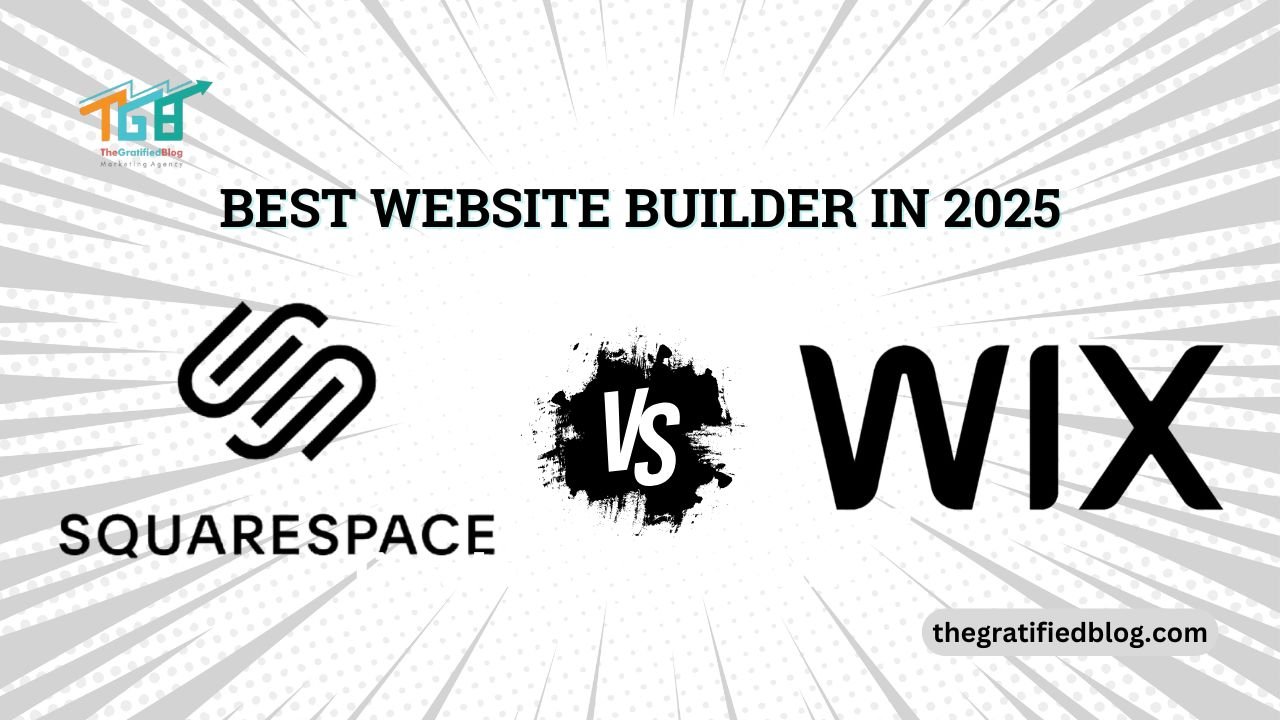
Building a website can feel like a big task, especially when you’re not sure which platform to choose. With so many options, two names that come up often are Squarespace and Wix. Both are well-known for their user-friendly website building tools, but when you look deeper, you’ll find key differences that may impact your decision. So, which one is the best website builder for 2025? Let’s dive into the details and figure out which platform suits your needs better.
Why Website Builders Matter?
Whether you’re a small business owner, a creative professional, or just someone looking to build an online presence, choosing the right website builder is crucial. In 2025, having an online presence is no longer optional—it’s a necessity. A good website builder can help you design a professional-looking site without needing to know a single line of code. That’s where Squarespace and Wix come in. They offer tools that make building a website more accessible than ever, but they do it in very different ways.
Website builders simplify the process of creating an online presence by offering:
- A range of pre-designed templates
- Drag-and-drop editors
- Integrated tools for SEO, eCommerce, and marketing
However, the right choice for you depends on your specific needs. Key factors to consider include:
- Ease of use
- Design flexibility
- Features like eCommerce and SEO
In this comprehensive blog, we’ll compare Squarespace vs Wix across several categories to help you make the best decision for your website in 2025.
An Overview of Squarespace
Squarespace is a website builder that has gained immense popularity for its sleek and professional design templates. Launched in 2003, it has been one of the go-to platforms for creatives such as photographers, designers, and small business owners who prioritise aesthetic appeal. Squarespace is often seen as a premium option because of its polished templates and ease of use for those who need a simple yet elegant website.
With Squarespace, you don’t need to be a web developer or designer to create a beautiful website. The platform is tailored for people who appreciate structured layouts, making it perfect for portfolios, online stores, and blogs that need to look professional without much effort. Squarespace is particularly popular among photographers, designers, artists, and entrepreneurs who want to showcase their work in the best possible light.
Squarespace offers an all-in-one platform that includes integrated eCommerce, blogging, SEO, and analytics. The idea is to make it as easy as possible for you to build, manage, and grow your online presence, without needing a variety of third-party plugins or additional services.
Understanding Wix
Wix, founded in 2006, is another powerful website builder that offers an extensive array of design flexibility and customisation options. It’s one of the most popular platforms available today, largely because of its drag-and-drop editor that allows users to build highly customisable websites with ease. Wix is ideal for users who want more creative control and flexibility over their website’s layout and design. The platform is versatile, making it suitable for personal projects, blogs, small business websites, and even large-scale eCommerce operations.
One of Wix’s key selling points is its massive app market, where users can integrate various third-party tools for marketing, analytics, social media, and eCommerce. This makes it ideal for people who want to add unique functionality to their websites or need specialised tools that aren’t built into the platform.
With its intuitive drag-and-drop editor, Wix is extremely beginner-friendly. Whether you’re creating a blog, a portfolio, or an online store, Wix gives you the freedom to design a site that feels uniquely yours.
Squarespace Vs Wix: Detailed Comparison
Here is the ultimate comparison between Wix and Squarespace, exploring their features, pricing, and design flexibility to help you choose the best website builder for your needs in 2025.
Ease of Use
When building a website, ease of use is one of the first factors people consider. Let’s see how both platforms perform in this area.
Squarespace:
Squarespace is known for its sleek, minimalistic interface. When you first start using it, everything feels polished and professional. However, for absolute beginners, the interface may feel a little overwhelming initially. While it’s not the easiest platform to jump into if you’ve never built a site before, the learning curve is manageable. Once you get the hang of it, you’ll appreciate the simplicity and clean design. Squarespace is best for users who prefer structure and are okay with sacrificing a little creative freedom for a more streamlined process.
Pros:
- Clean and uncluttered interface
- Offers structured layouts that guide your design process
- Built-in tutorials to help you along
Cons:
- Fewer customisation options compared to Wix
- Might feel limiting if you want total creative control
Wix:
On the flip side, Wix gives you more freedom right off the bat. The drag-and-drop editor is incredibly intuitive, meaning you can move elements wherever you want without worrying about structure. It’s perfect if you love experimenting with design or want complete creative control. However, this freedom can be a double-edged sword: some users might find the lack of structure makes it easier to create a cluttered design.
Pros:
- Very user-friendly, even for complete beginners
- Drag-and-drop functionality makes customisation easy
- Provides more flexibility in designing your site
Cons:
- Can become overwhelming with too many customisation options
- Too much freedom might make it harder to keep things looking professional
Verdict: If you’re looking for something easy to use without being too free-form, Squarespace is your best bet. But if you prefer having full control and playing around with your design, Wix is the way to go.
Templates and Design
Templates and design play a crucial role in how your website will look and feel. Both Squarespace and Wix offer a wide range of templates, but they have different strengths.
Squarespace:
When it comes to templates, Squarespace is known for its beautifully designed options. Their templates are sleek, modern, and professional, which is why they’re a favourite among photographers, designers, and creatives. Squarespace templates are designed with aesthetics in mind and are perfect for portfolios, online stores, and blogs. However, the downside is that Squarespace offers fewer templates compared to Wix, and customisation options are more limited.
Pros:
- Professionally designed templates with a modern look
- Great for portfolios, photography, and creative businesses
- Responsive designs that look great on all devices
Cons:
- Fewer templates compared to Wix
- Limited customisation for those who want to tweak designs heavily
Wix:
Wix, on the other hand, offers a much larger library of templates, making it ideal for users who want a wide variety of design options. You’ll find everything from creative portfolios to business-focused designs. The downside is that not all templates are as sleek or modern as Squarespace’s. However, Wix’s drag-and-drop editor allows you to customise your template to your heart’s content, so you can start with a basic template and transform it into something unique.
Pros:
- A huge variety of templates to choose from
- More freedom to customise templates down to the smallest detail
- A template for every type of business or personal project
Cons:
- Some templates may look outdated or less polished
- Can be easy to over-customize, leading to cluttered designs
Verdict: If design and aesthetics are your top priority, Squarespace wins with its polished and professional-looking templates. But if you value variety and customisation options, Wix’s extensive library will serve you better.
Features
When it comes to features, both Squarespace and Wix offer a robust set of tools, but they cater to different types of users.
Squarespace:
Squarespace is more of an all-in-one platform. It offers blogging, eCommerce, analytics, and SEO tools right out of the box. This makes it great for businesses or individuals looking for a complete package without needing too many external plugins or apps. If you’re looking for a streamlined experience with everything integrated, Squarespace could be the perfect solution for you.
Pros:
- Integrated eCommerce functionality
- Blogging platform with built-in SEO tools
- Comprehensive analytics to track site performance
- No need for external apps—everything is built-in
Cons:
- Fewer third-party integrations compared to Wix
- Limited app marketplace
Wix:
Wix’s app store is one of its standout features. If there’s a feature you need, there’s likely an app for it. From chatbots to email marketing tools, Wix’s ecosystem of apps lets you build a more complex site with specialised functionality. However, you’ll often need to rely on third-party apps for certain features, which can make managing your site a bit more complicated.
Pros:
- Extensive app marketplace for added features
- Great for integrating third-party tools
- Flexible eCommerce capabilities
Cons:
- Too many apps might overwhelm beginners
- Features often require third-party apps, adding complexity
Verdict: If you want everything neatly integrated without too many additional plugins, Squarespace is the better option. Wix is ideal if you want to add unique features and integrations to your site through its app marketplace.
eCommerce
If you’re planning to sell products or services online, your choice of platform is critical. Let’s see how Squarespace and Wix stack up in terms of eCommerce functionality.
Squarespace:
Squarespace’s eCommerce tools are robust and built directly into the platform. You don’t need to rely on external apps for your store to function smoothly. Whether you’re selling products, services, or even digital downloads, Squarespace provides you with everything you need, from inventory management to customer profiles. This makes Squarespace an excellent choice for small-to-medium-sized online stores.
Pros:
- No need for additional eCommerce apps
- Simple and straightforward for small-to-medium-sized online stores
- Supports digital products, physical goods, and services
Cons:
- Not as customisable as Wix in terms of store design
- Fewer payment gateways compared to other platforms
Wix:
Wix gives you more flexibility, but this also means you’ll need to install third-party apps for a lot of the eCommerce functionality. The trade-off is that you have more freedom to tweak your online store to look exactly how you want. This can be beneficial if you need specialised features, but it also requires more effort on your part to set up and manage.
Pros:
- Flexible design for your store
- Can add more eCommerce features through apps
- Supports a variety of payment methods
Cons:
- More complex to set up compared to Squarespace
- Might need third-party apps for additional eCommerce features
Verdict: If you want a simple, out-of-the-box solution for your online store, go with Squarespace. If you’re after more flexibility and are willing to put in a bit more effort, Wix is a good choice.
SEO and Marketing
SEO (Search Engine Optimization) and marketing tools are essential for getting your website noticed. Here’s how Squarespace and Wix perform in this area.
Squarespace:
Squarespace provides a solid set of SEO tools right out of the box. You can edit metadata, alt text, and even integrate Google Analytics without too much hassle. Their templates are also designed to be SEO-friendly, so you’re not starting from scratch. However, Squarespace’s SEO features are relatively basic compared to Wix.
Pros:
- Built-in SEO tools that are easy to access
- Clean, SEO-friendly code
- Simple integration with Google Analytics
Cons:
- Fewer advanced SEO features compared to Wix
- No dedicated app for additional SEO support
Wix:
Wix has taken big strides in the SEO department. They have an SEO wizard that walks you through optimising your site, even if you don’t know much about SEO. Plus, the app marketplace gives you access to additional tools to further improve your site’s ranking. For users who want more control over their SEO, Wix offers more flexibility and guidance.
Pros:
- SEO wizard makes optimising your site simple
- Access to additional SEO tools via apps
- Good for beginners and advanced users alike
Cons:
- More work involved to get the same level of SEO as Squarespace
- Can feel overwhelming with too many options
Verdict: For straightforward SEO, Squarespace’s built-in tools make it easy. However, Wix offers more flexibility and guidance, making it a better option for users who want to dive deeper into SEO.
Support and Community
No matter how user-friendly a platform is, having good customer support can make a big difference. Here’s how Squarespace and Wix compare in terms of customer support and community resources.
Squarespace:
Squarespace offers 24/7 email support, live chat, and a strong knowledge base. They also have active user communities and tutorials to help you get the most out of the platform. That said, some users find that live chat isn’t always available immediately, especially during high-traffic times.
Pros:
- 24/7 email support and live chat
- Comprehensive knowledge base
- Active user community
Cons:
- Live chat can sometimes be slow to respond
- No phone support
Wix:
Wix also offers 24/7 support, but they add phone support into the mix. Their help centre is filled with tutorials, and the Wix community is quite large, so you’re never too far from finding a solution to your problem.
Pros:
- 24/7 support with phone, email, and chat options
- Lots of tutorials and help articles
- Large, active user community
Cons:
- Wait times for support can be longer
- Tutorials can sometimes feel a bit overwhelming
Verdict: Both platforms offer strong support, but if you need phone support, Wix is your best bet. Squarespace’s live chat and knowledge base, however, are excellent for those who prefer self-guided troubleshooting or chatting with a representative.
Pricing
For many users, pricing can be a deciding factor when choosing a website builder. Let’s break down the costs of using Squarespace and Wix in 2025.
Squarespace:
The Squarespace pricing page offers four distinct plans designed to accommodate a range of users, from individuals to businesses of various sizes. Here’s a breakdown of each plan:
For detailed information, visit Squarespace pricing page.
Wix:
The Wix pricing offers a range of plans to accommodate different types of users, from personal websites to businesses and eCommerce stores. Here’s a summary of the main pricing tiers:
For more details, visit Wix pricing page.
Verdict: Both platforms offer a range of pricing options, and the right pricing depends on your specific budget and needs, such as design flexibility, eCommerce requirements, and storage.
Customisation and Flexibility
Customisation is key for anyone who wants their website to reflect their unique brand or style. Here’s how the two platforms compare when it comes to giving you control over your design.
Squarespace:
Squarespace’s design flexibility is somewhat limited compared to Wix. The platform offers a range of beautiful templates, but customisation options are more structured. While you can adjust fonts, colours, and images, you won’t have the same level of freedom to move elements around or completely redesign the template. This can be an advantage if you want to ensure that your site looks polished and professional, but it can feel restrictive if you have a very specific vision in mind.
Pros:
- Structured templates help maintain a clean, professional design
- Simple customization options for fonts, colours, and images
- No risk of over-customizing and making your site look cluttered
Cons:
- Less design freedom compared to Wix
- Can feel limiting for users who want to build a completely custom site
Wix:
Wix shines in terms of customisation and flexibility. The drag-and-drop editor allows you to place elements anywhere on your site, giving you complete control over the design. Whether you want to start from a blank canvas or tweak a template, Wix offers unparalleled creative freedom. However, with this freedom comes the risk of over-designing your site and making it look cluttered or inconsistent.
Pros:
- Full design freedom with drag-and-drop functionality
- Ability to customise every element of your site
- Blank canvas option for users who want to start from scratch
Cons:
- Can be easy to over-customize and lose consistency in design
- Requires more effort to maintain a professional look
Verdict: If you want full control over your website’s design and are willing to invest time in customising it, Wix is the better choice. If you prefer a more structured approach that ensures a professional look, Squarespace is the way to go.
Mobile Optimisation
With mobile traffic accounting for a large portion of website visits, it’s essential that your site looks great and performs well on mobile devices.
Squarespace:
Squarespace templates are all fully responsive, meaning they automatically adjust to fit any screen size. This ensures that your site will look great on mobile devices without you needing to make any adjustments. The platform also offers a mobile preview feature, so you can see exactly how your site will appear on smartphones and tablets.
Pros:
- Fully responsive templates that look great on all devices
- No need to create a separate mobile version of your site
- Mobile preview feature for easy testing
Cons:
- Limited ability to customise the mobile version of your site
Wix:
Wix offers a bit more control over the mobile version of your site. While Wix templates are also responsive, the platform allows you to make separate customizations specifically for the mobile version. This can be a great advantage if you want to fine-tune your site’s appearance on mobile devices. However, it does require more effort to maintain both the desktop and mobile versions of your site.
Pros:
- Ability to customise the mobile version of your site separately
- Mobile editor lets you make specific adjustments for mobile devices
- Mobile-responsive templates that automatically adjust to screen size
Cons:
- Requires more effort to manage mobile and desktop versions
- Risk of inconsistency between mobile and desktop designs
Verdict: Squarespace offers a simpler, more streamlined approach to mobile optimisation, while Wix gives you more control over how your site looks on mobile devices. If you want to ensure consistency across all devices with minimal effort, Squarespace is the better choice. If you need more flexibility for mobile design, Wix is the way to go.
Integrations with Third-Party Apps
The ability to integrate third-party apps and tools can be a game-changer for your website’s functionality.
Squarespace:
Squarespace is an all-in-one platform, meaning most of the tools you need are built-in. However, this also means that there are fewer options for third-party integrations. Squarespace does offer some integrations with popular tools like Mailchimp, Google Analytics, and Instagram, but the selection is more limited compared to Wix.
Pros:
- Built-in tools for SEO, eCommerce, and analytics
- Simple integration with essential third-party tools
- No need to rely on external apps for most features
Cons:
- Fewer third-party integrations compared to Wix
- Limited app marketplace
Wix:
Wix’s app marketplace is one of its biggest strengths. Whether you need advanced marketing tools, social media integrations, or specialised eCommerce features, there’s likely an app for it in the Wix App Market. This makes Wix incredibly expandable, allowing you to add new features and functionality to your site as your needs grow.
Pros:
- Extensive app marketplace with a wide range of third-party integrations
- Easy to add new features through apps
- Great for users who need specialised tools or custom functionality
Cons:
- Too many apps can make your site more complex to manage
- Some apps require additional fees
Verdict: If you prefer an all-in-one platform with built-in tools, Squarespace is the better choice. If you want the flexibility to add new features and integrations as needed, Wix’s app marketplace makes it the more expandable option.
Which One Is Best for 2025?
Choosing between Squarespace and Wix ultimately comes down to your personal preferences and the type of website you’re building. Both platforms have their strengths, but the right choice for you will depend on your specific needs and goals.
- Choose Squarespace if you value simplicity, sleek design, and an all-in-one solution that works right out of the box. It’s ideal for creative professionals, small businesses, and those looking for a polished, minimalistic approach.
- Choose Wix if you prefer customisation, flexibility, and the ability to tweak your site with a wider range of apps and features. It’s great for beginners who want full creative control and are willing to explore the platform’s vast capabilities.
Both platforms are likely to evolve and improve over time, but as of 2025, the best website builder for you will be the one that aligns most closely with your unique needs and the level of control you want over your site.
Conclusion
As we move into 2025, both Squarespace and Wix continue to lead the pack as two of the best website builders available. The best platform for you will ultimately depend on your priorities: whether you prefer a more guided, polished approach with Squarespace, or the creative freedom and customisation options that Wix provides. Whatever you choose, both platforms offer powerful tools to help you build a website that suits your needs and helps you succeed online.








No Comments